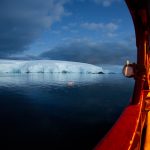 May 23, 2019 12:47 pm
Published by Climate Extremes
May 23, 2019 12:47 pm
Published by Climate Extremes
CLEX researchers find strong correlation between ozone hole size and Australian summer temperatures. While there is no causal link between the two, the changes are driven by the same source - ocean temperatures.
 March 22, 2019 10:39 am
Published by Climate Extremes
March 22, 2019 10:39 am
Published by Climate Extremes
AMOS awards, international visitors, cross program research with the drought team, and multiple papers have made it a busy time for the Heatwaves and Cold Air Outbreaks Research Program.
 March 20, 2019 2:15 pm
Published by Climate Extremes
March 20, 2019 2:15 pm
Published by Climate Extremes
The Climate Variability and Teleconnections team welcomed new members, celebrated a range of triumphs and explored questions about Antarctic sea ice extent, ocean heat transfer, ENSO and the Tropical Observing System.
 March 18, 2019 3:12 pm
Published by Climate Extremes
March 18, 2019 3:12 pm
Published by Climate Extremes
Two workshops, the Sea Ice Modelling Workshop and Centre of Excellence for Climate Extremes “Southern Annular Mode (SAM) Cluster” workshop were held together at the Institute for Marine and Antarctic Studies in Hobart from February 19-21.
 January 18, 2019 10:43 am
Published by Climate Extremes
January 18, 2019 10:43 am
Published by Climate Extremes
Antarctic sea ice extent underwent a rapid decline in the spring of 2016 and is still well below average now. CLEX researchers have tied the decline to natural variability of both the atmosphere and ocean in two articles published in Nature Communications this month.
 August 14, 2018 2:49 pm
Published by Climate Extremes
August 14, 2018 2:49 pm
Published by Climate Extremes
The associations between rainfall variability, ENSO and temperature appeared to be stationary early in the record, but there was a hint that there was some evidence of a shift in the late 1990s. Has that shift continued? Alternatively, have the rainfall variance characteristics returned to what was observed earlier in the record? This project will use the latest observed datasets to explore these questions.






